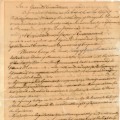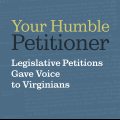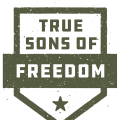ONLINE EXHIBITIONS

Homefront to Frontline: Virginia's WWII Story
(Online Exhibition)
"Homefront to Frontline: Virginia's WWII Story," a lobby display, online exhibition and a collection of online resources commemorating the 80th anniversary of World War II, brings to life the experiences of those who served in the military as well as those who supported the war effort at home.

John Mitchell Jr. and the Richmond Planet, a Newspaper "Born in the Wake of Freedom"
(Online Exhibition)
John Mitchell Jr., founder of Richmond's first Black newspaper, the Richmond Planet, was a man of enormous stature and complexity. The Library of Virginia's web exhibition John Mitchell Jr. and the Richmond Planet, a Newspaper "Born in the Wake of Freedom" provides a context in which to understand Mitchell's life and work. It sheds light on his many contributions to the social and political life of Virginia's African American community while offering a glimpse into the world of newspaper publishing as America entered the twentieth century.

Titanic in Black and White
(Online Exhibition)
With its worldwide newspaper coverage in April 1912, the sinking of the liner Titanic was one of the first truly international news events. Titanic in Black and White, an online exhibition from the Library of Virginia, explores the disaster and its cultural impact through newspaper coverage. A list of the Titanic crew and passengers is provided.

Virginia Constitutions
(Online Exhibition)
The state constitution intimately affects all aspects of our daily lives. While students learn about the U.S. Constitution, the Bill of Rights, and all the amendments, many people do not realize
that the laws passed in their state are informed and shaped by a state constitution.
Virginia created its first state constitution in 1776. Since then, Virginia has fully revised its constitution six times, with additional adjustments along the way. Those changes are inspired by perceived social and political needs, and can result in economic opportunity to some and disadvantage to others; changes in the kind of public education our children receive, if any; and determining who may vote and who may not. A state constitution shapes our present and future, yet many are unaware of its existence.
We invite you to learn more about Virginia’s Constitutions by exploring the historical context of each document, discovering them in our digital collections, and exploring their meaning and influence on our lives.

Your Humble Petitioner: Legislative Petitions Gave Voice to Virginians
(Online Exhibition)
On view February 7, 2022-November 19, 2022
Imagine having to explain to the House of Delegates why you want to divorce your spouse, or change your name, or take other actions that affect your life. Virginians had to do just that for nearly a century. Their stories can be found in the Library's Legislative Petitions Collection.
During the years between the American Revolution and the Civil War, Virginians submitted petitions to the General Assembly to bring local or personal issues to the attention of their legislators. The Library's collection of nearly 25,000 petitions reveals how Virginians communicated their concerns on a wide range of topics. To obtain legal permission to operate a ferry, maintain a tavern, or carry out many other activities, residents of the commonwealth were required to introduce a petition into the House of Delegates to begin the process of acceptance or rejection. The right to petition was not restricted by class, race, or sex. Your Humble Petitioner highlights petitions that involved deeply personal issues such as divorce and requests by emancipated Black people to remain in the commonwealth, offering a glimpse into the realities of 18th- and 19th-century life.
The right of citizens to petition their government is an ancient one, dating back indirectly to the Great Charter (Magna Carta) from 1215 and in the First Amendment to the U.S. Constitution. Even today, citizens of Virginia exercise their right to petition their government.

Columbia Pike: Through the Lens of Community
(Online Exhibition)
Exhibition Gallery & Lobby | August 31, 2021 - January 8, 2022
Columbia Pike: Through the Lens of Community
Columbia Pike: Through the Lens of Community, a unique exhibition of photographs at the Library of Virginia, celebrates the extraordinary cultural diversity found within a single community in Northern Virginia. Columbia Pike Documentary Project photographers, whose personal connections to the community allowed them to capture the strength, pride, resilience, elegance, and beauty of so many overlapping cultures, created the works on view. More than 70 of the thousands of photographs transferred to the Library of Virginia's collections this spring will be highlighted in Columbia Pike: Through the Lens of Community. The exhibition will also include information about the neighborhood, the residents, and the photographers themselves. As the nation seems more divided than ever, this collection shows how one community is making diversity work.
For more information on Columbia Pike, visit its web page.

True Sons of Freedom
(Online Exhibition)
Exhibition Gallery & Lobby January 16, 2018 - November 9, 2018
True Sons of Freedom, a photographic exhibition at the Library of Virginia, explores the stories of Virginia's African American soldiers who served during World War I. More than just mementos for families and sweethearts, these portraits challenge the crude and demoralizing cultural products of an era that often reduced African Americans to stereotypes and denied them full participation as citizens of the United States. Reflecting the pride and determination of African American World War I servicemen, the images were submitted with the soldiers' responses to military service questionnaires created by the Virginia War History Commission as part of an effort to capture the scope of Virginians' participation in the Great War. The original photographs, reproduced in the gallery at nearly life-size dimensions, place visitors at eye level in front of the soldiers. The monumental scale allows viewers the opportunity to examine rich details not seen in the original photo postcards
For more information about the traveling version of this exhibition, please contact Barbara C. Batson, exhibitions coordinator, at barbara.batson@lva.virginia.gov. To view the current itinerary for this exhibit, please click here.
Running for Office
(Online Exhibition)
American political ephemera is older than America itself. Thomas Paine's "Common Sense" set the tone for using plain language for persuasion to a political side. Flyers, pamphlets, posters, buttons, television ads, and more use the same plain persuasive language today. "Running for Office" highlights 20th century political ephemera found at the Library of Virginia.
Washington
(Online Exhibition)
This online exhibit focuses on the evolution of the District of Columbia, Alexandria and Virginia as told through maps. Maps from several Library of Virginia collections show the District from the eighteenth century through the American Civil War, and when the Town of Alexandria was a part of the District from the 1790s until 1846, when it was retro–ceded to the Commonwealth of Virginia. Here, you will find maps from several collections that tell that story and were exhibited as part of the Library's 13th annual Alan M. and Natalie P. Voorhees Lecture on the History of Cartography on April 16, 2016, titled "Virginia's District of Columbia."
Geographia
(Online Exhibition)
The Alan M. Voorhees Map Collection extends from the 1493 Nuremberg Chronicle through the U.S. Civil War period with the bulk of the collection consisting of pre–20th century maps. Included are maps made by Schedel, Ptolemy, deBry, Mercator, and Smith among many others. In a variety of map formats, such as nautical charts and views, the collection focuses primarily on the Chesapeake Bay area and the development of Virginia within the larger geographical and historical contexts of Europe and America.


